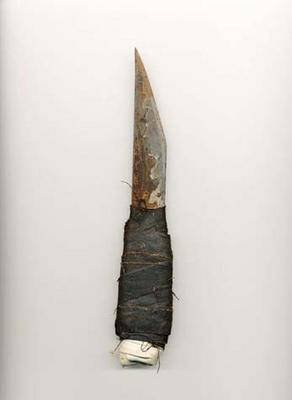What is the difference between a shiv and a shank?

I thought, sure, that was it. End of.
Alas, not.
I was slightly disheartened after reading this; from the blog post:
Shiv
Shiv is a word that can be both a noun, as well as a verb. As a noun, it refers to a knife or, still better, a slang term for a knife. As a verb, it refers to the act of stabbing someone with a sharp object. The word has origins in the gypsy tribes of Romania and Moldova that used such objects. If you are derisive or taunting someone, you can say that he used a Shiv to cut the rope. Of course, you said it as he did not make use of a proper knife to cut the rope.
Shank
Shank is a term that is used for anything that looks or works like a knife. It is of course a slang term for this kind of a homemade knife. It may not even be metallic to be labeled a shank. You can call a shard of glass with a cloth tied at one end as a shank.
What is the difference between Shiv and Shank?
- Both Shiv and shank are slang terms for objects that look or work like knives.
- Shiv is often used to refer to sharp weapon like objects made by prisoners.
- The word Shiv comes from the gypsies of Romania who used them for a knife like object.
- Shiv is both a noun as well as a verb while shank is just a noun.
The probably extremely factually correct and wholly reliable Oz TV Wiki says shiv equals shank (and vice versa). What to believe?
This post in the Teratology blog contains the most in-depth analysis of the matter that I have found:
In modern slang, the two are most often used interchangeably, in much the same way that the nouns “cemetery” and “graveyard” are used to describe a place of rest for the dead. The amalgamated origins behind the use of the term “shiv”, combined with a verbal evolution which freely alternates between the two has led to a wholly confused usage in the modern American dialect. Despite the seemingly interchangeable properties of the terms, the heart of their differences lies in the definitions. A “shiv” is defined as a knife. A knife, in turn, is defined as “an instrument for cutting, consisting essentially of a thin, sharp-edged, metal blade fitted with a handle.” Thus, through transitive logic, a shiv is an instrument designed for cutting or slicing in the same fashion as a knife.
Furthermore:
Despite the seemingly interchangeable properties of the terms, the heart of their differences lies in the definitions. A “shiv” is defined as a knife. A knife, in turn, is defined as “an instrument for cutting, consisting essentially of a thin, sharp-edged, metal blade fitted with a handle.” Thus, through transitive logic, a shiv is an instrument designed for cutting or slicing in the same fashion as a knife.
Given the previous description of items related to the noun “shank” (those being items which taper from large to small), it becomes clear that the noun “shank” more specifically refers to an elongated item which tapers to a point and is thus is primarily used for stabbing. Similarly, the verb “to shiv” translates as “to slice” or “to knife” while the verb “to shank” correlates with “to stab.”
Hence, the author differs a shiv from a shank depending on use:
- shiv = cut
- shank = stab
Hence, any self-made weapon that can cut is a shiv. Any self-made weapon that can stab is a shank.
I'm not sure that this is the end of it.
I've only heard the words on American prison-based TV-series and only read them in prison-related and gang-related texts, and then, both a shank and a shiv are makeshift and made as well as possible by the use of crude materials.
Regardless of vernacular, one should think about these things, especially before you opt to shiv or shank someone.
Posted from my blog with SteemPress : https://niklasblog.com/?p=23492